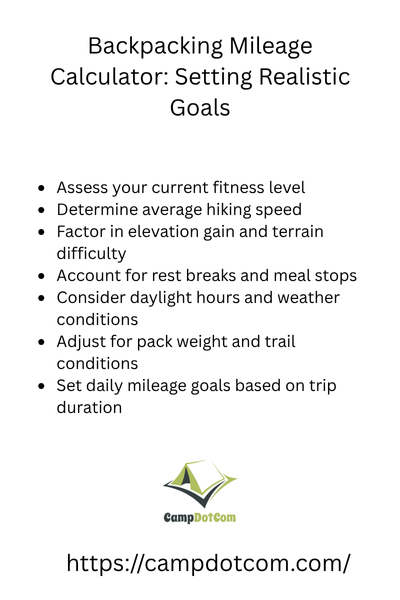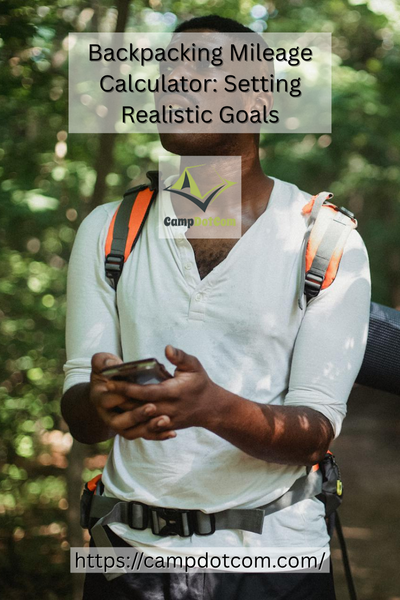So, you’ve got your backpack packed, your boots laced up, and that undeniable itch to hit the trail. But wait—how far should you actually hike in a day? That’s where a backpacking mileage calculator comes in handy. Trust me, getting this right can make or break your adventure.
Read More About Backpacking Mileage Calculator

Why a Backpacking Mileage Calculator Matters
I’ll admit it—when I first started backpacking, I wildly overestimated my abilities. I thought, “Hey, I can totally do 15 miles a day, no problem!”
Spoiler alert, I was wrong. By mile ten, I was hobbling like an old cowboy, and my feet were screaming at me to stop. That’s when I realized I needed a backpacking mileage calculator to set smarter, more achievable goals.
As an Amazon Associate, I earn from qualifying purchases. Some of the links in this article are affiliate links. This means that, at zero cost to you, I will earn an affiliate commission if you click through the link and finalize a purchase.
More Things to Know About Backpacking Mileage Calculator

The thing is, everyone’s hiking pace is different. Some people cruise along effortlessly, while others (like me, at first) need more breaks than expected. That’s why it’s crucial to plan ahead based on your fitness level, terrain, and trail conditions.
Factors That Affect Your Daily Mileage
1. Your Fitness Level
Let’s be real—if you haven’t walked more than a mile in months, suddenly expecting to hike 12 miles with a heavy pack is, well, ambitious (and painful).
Start small, build endurance, and use a backpacking mileage calculator to adjust expectations.
2. Terrain & Elevation
Flat, well-groomed trails? You’ll cover ground quickly. Rocky, steep ascents? Not so much. I once tried tackling a trail with a 2,000-foot climb right after lunch—big mistake. If you’re dealing with elevation gain, plan for slower progress.
3. Pack Weight
A light pack makes for a happy hiker. A heavy pack? That’s a ticket to sore shoulders and slower mileage. If you’re carrying a full multi-day setup, factor that into your backpacking mileage calculator.
4. Weather Conditions
Rain, snow, or brutal heat can slow you down big time. I once hiked in a surprise downpour, and let’s just say it wasn’t my fastest day on the trail. Check the forecast and adjust your mileage goals accordingly.
5. Rest Breaks & Pace
Some hikers charge ahead without stopping, while others take frequent breaks to soak in the views (or snack—because snacks are life). Be honest about your style and build in time for breaks.
How to Use a Backpacking Mileage Calculator
Alright, let’s break it down. A good backpacking mileage calculator helps you estimate how far you can hike based on key factors:
- Base Hiking Speed – Most people hike between two to three miles per hour on moderate terrain.
- Elevation Adjustment – Add 30-60 minutes for every 1,000 feet of climb.
- Pack Weight Impact – Heavier packs slow you down, so adjust accordingly.
- Break Time – Factor in five to ten minutes of rest per hour.
- Trail Conditions – Rough terrain? Budget extra time.
Let’s say you hike at 2.5 mph on flat terrain, but you’re facing 2,000 feet of elevation gain over ten miles. That climb alone could add one to two hours to your day. Plug those numbers into a backpacking mileage calculator, and you’ll get a much more realistic daily mileage goal.
Setting Realistic Goals (And Avoiding Trail Regret)
One of the biggest mistakes new backpackers make? Overestimating mileage. It’s better to plan for shorter days and enjoy the experience rather than push too hard and end up exhausted.
Trust me, there’s nothing worse than hitting camp after dark, utterly wiped out, and still having to set up your tent.
Here’s my go-to strategy:
- If you’re new, start with six to eight miles per day.
- Intermediate hikers can aim for 10-12 miles.
- Experienced trekkers might push 15+ miles, but only on favorable terrain.
And remember, it’s not a race. Take your time, enjoy the journey, and listen to your body.
Maximize Your Adventure with the Backpacking Mileage Calculator
So next time you are planning a trip, do not just take a wild guess at how far you will hike each day. Use a backpacking mileage calculator to set realistic goals. Your feet and your future self will be so glad you did.
Hiking should feel like an adventure, not a test of survival. Plan wisely, enjoy the journey, and who knows—you might still have the energy to catch that sunset view instead of falling asleep the moment you reach camp.
Ever had a funny or painful moment from misjudging your hiking distance? I would love to hear your story.
